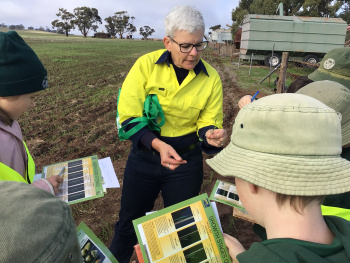
South Australian Science Teachers Association
Agriculture – the ultimate STEM subject!
Posted by SASTA
on 17/11/2025

Are you looking for a stimulating and thought-provoking context to teach your students science inquiry skills and science as a human endeavour? Then agriculture is your solution! Food and fibre provides instantly engaging content – we all eat and wear clothes so the end products of the ag supply chain are all around us. However, many of us are quite disconnected from how it all happens. Research shows that students are not aware that ag is a tech-rich, innovative sector and that there are amazing career opportunities for them, no matter what their skill set is. Currently, there are six jobs for every graduate from a Bachelor of Agricultural Science and because of this big shortfall, the roles being offered are well-paid and resourced. And the work they are doing is important – feeding the world, protecting the environment and dealing with challenges like climate change.
 There are excellent curriculum-mapped teaching resources available that do not require you to have experience with ag. Hosted by the Primary Industries Education Foundation of Australia (PIEFA), Primezone has a great search function and education resources for all ages and Career Harvest is a student-friendly website showcasing the diverse pathways and career options in agriculture. Did you know that only 30% of jobs in ag are on-farm? And that about 50% of jobs are metropolitan-based? You don’t need to own a farm or have ag experience to work in ag – but you do need to be keen to work in teams, solve problems and be future-focused!
There are excellent curriculum-mapped teaching resources available that do not require you to have experience with ag. Hosted by the Primary Industries Education Foundation of Australia (PIEFA), Primezone has a great search function and education resources for all ages and Career Harvest is a student-friendly website showcasing the diverse pathways and career options in agriculture. Did you know that only 30% of jobs in ag are on-farm? And that about 50% of jobs are metropolitan-based? You don’t need to own a farm or have ag experience to work in ag – but you do need to be keen to work in teams, solve problems and be future-focused!
 Still not convinced ag would work at your school? Did you know that you can access the support of the Lead Agriculture Teacher for SA for free? This is an industry funded role, supporting food and fibre programs and teachers across the state, in public and private schools. Sue Pratt taught agriculture at Balaklava High School for many years, has extensive involvement with curriculum writing (she wrote the Department for Education’s agriculture Units of Work for years 7-10, housed on Plink under Technologies) and is very experienced with SACE programs. She can visit your site, plan how you can add some agriculture into your program and connect you with industry experts. You can contact Sue via email sue.pratt@agcommunicators.com.au and check out her education resources at Education – AgCommunicators.
Still not convinced ag would work at your school? Did you know that you can access the support of the Lead Agriculture Teacher for SA for free? This is an industry funded role, supporting food and fibre programs and teachers across the state, in public and private schools. Sue Pratt taught agriculture at Balaklava High School for many years, has extensive involvement with curriculum writing (she wrote the Department for Education’s agriculture Units of Work for years 7-10, housed on Plink under Technologies) and is very experienced with SACE programs. She can visit your site, plan how you can add some agriculture into your program and connect you with industry experts. You can contact Sue via email sue.pratt@agcommunicators.com.au and check out her education resources at Education – AgCommunicators.
And National Ag Day is on 21 November – check out the resources available and build some ag into your science to celebrate the amazing people who feed the world!
Archive
- March 2026
- February 2026
- January 2026
- December 2025
- November 2025
- October 2025
- September 2025
- August 2025
- July 2025
- June 2025
- May 2025
- April 2025
- March 2025
- February 2025
- January 2025
- December 2024
- November 2024
- October 2024
- September 2024
- August 2024
- July 2024
- June 2024
- May 2024
- April 2024
- March 2024
- February 2024
- December 2023
- November 2023
- October 2023
- September 2023
- July 2023
- June 2023
- May 2023
- April 2023
- March 2023
- February 2023
- January 2023
- December 2022
- November 2022
- October 2022
- August 2022
- July 2022
- June 2022
- May 2022
- April 2022
- March 2022
- February 2022
- January 2022
- December 2021
- November 2021
- October 2021
- September 2021
- August 2021
- July 2021
- June 2021
- May 2021
- April 2021
- March 2021
- February 2021
- January 2021
- December 2020
- November 2020
- October 2020
- September 2020
- August 2020
- July 2020
- June 2020
- May 2020
- April 2020
- October 2018
- September 2018
- August 2018
- July 2018
